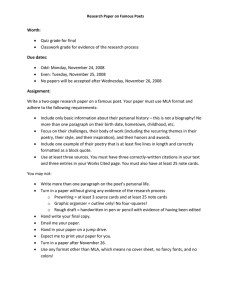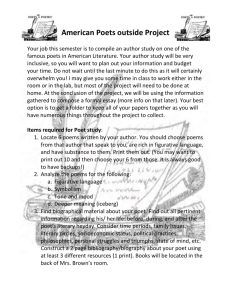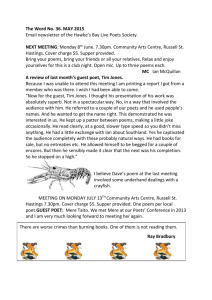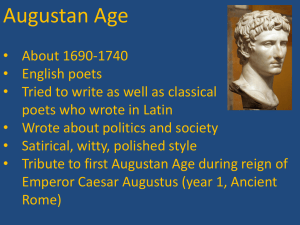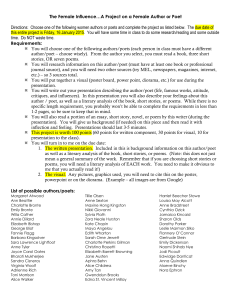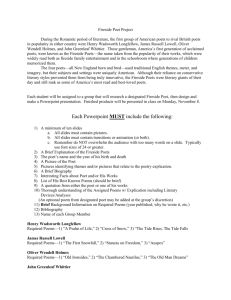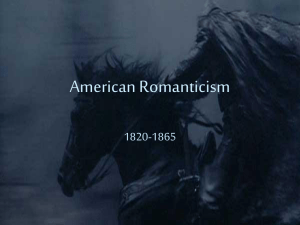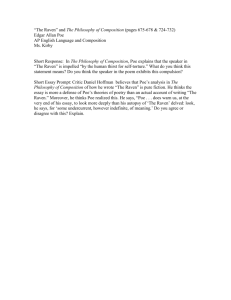The Romantic Poets (8) Romanticism (1800 – 1860) Washington
advertisement
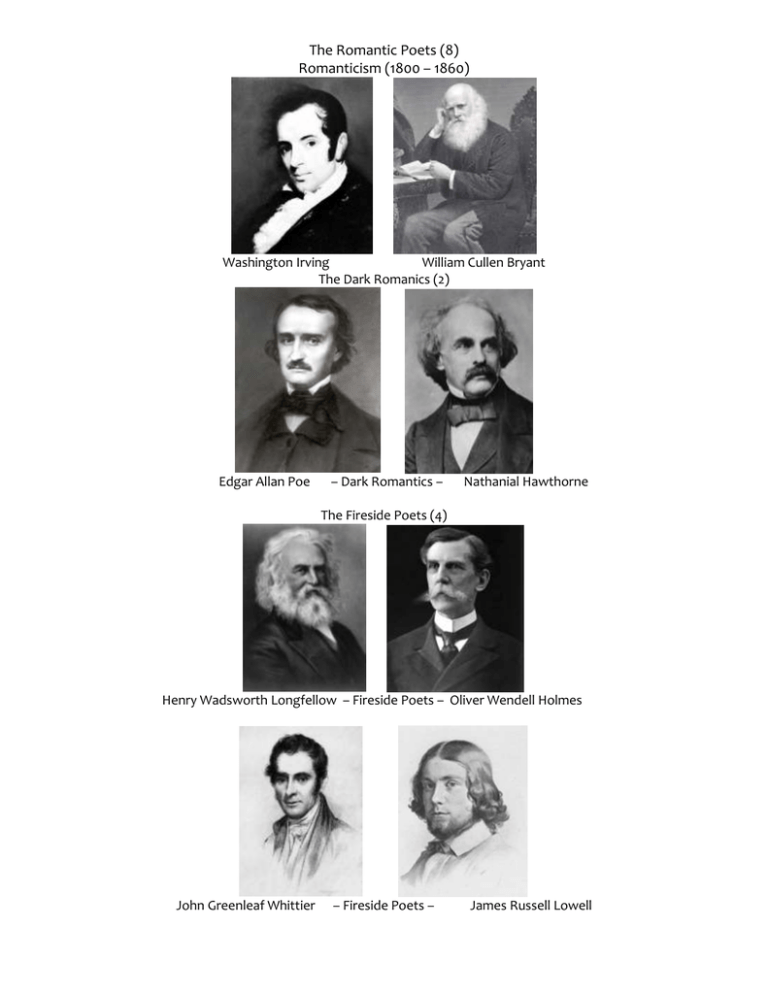
The Romantic Poets (8) Romanticism (1800 – 1860) Washington Irving William Cullen Bryant The Dark Romanics (2) Edgar Allan Poe – Dark Romantics – Nathanial Hawthorne The Fireside Poets (4) Henry Wadsworth Longfellow – Fireside Poets – Oliver Wendell Holmes John Greenleaf Whittier – Fireside Poets – James Russell Lowell Washington Irving – Rip Van Winkle William Cullen Bryant – Thanatopsis Edgar Allan Poe – The Fall of the House of Usher / The Raven Nathaniel Hawthorne – The Minister’s Black Veil Henry Wadsworth Longfellow – The Tide Rises, the Tide Falls / The Cross of Snow Oliver Wendell Holmes – Old Ironsides ROMANTICISM (1800 – 1860): Events: Slavery; National Anthem; Cities Doubled; Poets lived in the countryside; small towns, mountains or farms. Nature set the tone for their poetry. Sought unspoiled nature. Believed cities were of disease, death, and moral destruction. Nature = beauty Nature = spirituality Nature = life lessons Life cycle = birth, growth, death and rebirth Poems = positive Poems going beyond logical Poetry = highly valued Preferred youth over wisdom. WASHINGTON IRVING (1783 – 1859): Rip Van Winkle Invented comical fictional narrators Didn’t sign name until 50 years old Pen-names: Jonathan Oldstyle, Gent., Diedrich Knickerbocker, Geoffrey Crayon Sarcasm: A literary tone used to ridicule or make fun of a human weakness. Did not want to follow the family business. Droll: Oddly amusing and comical. RIP VAN WINKLE WILLIAM CULLEN BRYANT (1794 – 1878) Thanatopsis First American Romantic Poet Believed in deism: Belief in God, but denial of revelations). Felt divinity (religion, spirituality) could be found in nature. Started writing poetry at age nine Was going to be a lawyer, but became a poet Thanatopsis (he was only 17) made him famous One of the founders of the Republican Party Father of American Poetry Value Emotion / Intuition over Reason / Logic. Value Imagination over Rational thinking Placed faith on the inner experience. Romantic Poets (8): o Irving o Bryant Dark Romantics: o Poe o Hawthorne Fireside Poets: o Longfellow o Holmes o Whittier o Lowell Published in 1819 Frame: A story within a story The Setting: Catskill Mountains, Appalachians, Hudson, New York Rip was a simple, good natured, obedient and henpecked husband Got along with everyone Attends to everybody else’s business except his own. Squirrel hunting is his favorite sport. Sleeps for 20 years. When he wakes, he notices that his gun is rusted and his dog is gone. Dog’s name is Wolf. Body is stiff – hard to walk. Doolittle’s Hotel has replaced the Village Inn Flag pole has replaced shade tree. Discuss Revolutionary War Burst blood vessel killed Dame Winkle. THANATOPSIS An elegy = a poem expressing sorrow for someone who is dead. Thanatos (death) + Opsis (seeing) A way of looking at death & a way of thinking about it. Pall = coffin Sepulcher = burial place Shroud = cloth used to wrap a dead body Narrow House = grave About life and death DARK ROMANTICS (2) Edgar Allan Poe Nathaniel Hawthorne Still valued intuition over logic & reason Believed in signs/lessons from nature Also believed that if good existed, then so did EVIL o o o o o EDGAR ALLAN POE (1809 – 1849) The Fall of the House of Usher The Raven Dark Romantic Poet Life of tragedy Both parents were actors (seen as a vulgar career) All women in his life died of TB (Tuberculosis) Never adopted by John & Frances Allan. Attended the University of Virginia / West Point Married his 13-year-old cousin, Virginia – very happy Master of the psychological thriller Virginia died in 1847 Poe was found in ditch after missing for a week, dying 4 days later. Last words were “Lord help my poor soul.” Wrote Annabel Lee to immortalize Virginia Used symbols & motifs in writing: o Eyes o Heart o Unnamed narrator o Dreams Dark side of life Believed that most people were inherently good, but could be wicked Works explored the conflicts between good & evil, guilt & sin, & the madness of the human mind Two sides of oneself / twins Vortex Animals Premature death / suffocation Time / clocks THE FALL OF THE HOUSE OF USHER Takes place during Autumn Narrator – friend of Roderick Usher Symbolism – the physical house and the family of Usher dying (“fall”) Roderick buries sister, Madeline, alive Ushers go mad / house swallowed up by tarn or lake Oppressive = weighing heavily on the mind or spirits; causing depression or discomfort Insipid = bland Cadaver = dead body Stealthy = sneaky, secretive Vivacious = lively Sullen = sad, depressed Poem within story = “The Haunted Palace” THE RAVEN Overnight success Poe was paid $14 for it Narrator was student Setting is speaker’s room / library in December at midnight He couldn’t sleep – reading – hears a tapping – no one is there Visited by a Raven, who constantly says, “Nevermore!” Sadness, sorrow, no hope – his wife, Lenore, is dead Raven’s “Nevermore” – o Raven will not leave speaker o No relief o Will not see Lenore again o Rhymes with Lenore Mood is ominous or dark, threatening Ominous = giving the impression that something bad or unpleasant is going to happen; threatening; inauspicious. Imagery = visually descriptive or figurative language Images: “bleak December” (cold), storming, “dying ember” Tone is amusing at first – becomes desperate & angry at the end Symbolism – the raven symbolizes death, loss, or despair / grim reaper NATHANIEL HAWTHORNE (1804 – 1864) The Minister’s Black Veil The Scarlet Letter Dark Romantic Poet Works admired today more than when it was written Grew up Puritan = thought it equaled guilt Partier – chewed tobacco, played cards, drank wine Sees black veil on everyone Hates his reflection in veil Becomes better / more efficient minister Plighted wife = promised wife – arranged THE MINISTER’S BLACK VEIL Hawthorne called it a Parable Parable = A short story with a moral lesson Minister wears a veil to show that he has sinned Never takes it off Fiancée, Elizabeth, leaves – comes back to be his nurse THE FIRESIDE POETS (4) HENRY WADSWORTH LONGFELLOW (1807 – 1882) The Tide Rises, the Tide Falls The Cross of Snow Fireside Poet Was and is still one America’s most popular poets Wrote about things people could relate to – values, character, & comfort Born in Maine Used Atlantic Coast for inspiration Went to Bowdoin College (Hawthorne was one of his classmates) First wife died from a miscarriage Professor at Harvard Met and married another woman – had 6 children In 1854 wrote fulltime Second wife tragically died from a fire Meter = pattern of stressed and unstressed syllables in poetry Metaphor = a figure of speech that compares two unlike things without use of “like” or “as” Personification = a figure of speech in which object or animal is given human characteristics Alliteration = repetition of initial consonant sounds THE TIDE RISES, THE TIDE FALLS Addresses our relationship with nature. Nature is a series of cycles; however, human life is limited, without repeating cycles THE CROSS OF SNOW Grief is most difficult emotion for humans to express Used nature to express emotions that were too painful or difficult to express directly Lost both wives tragically – shows in this poem OLIVER WENDELL HOLMES (1809 – 1894) Old Ironsides Fireside Poet A surgeon and a poet Felt being a surgeon taught him humanity Coined the word anesthesia (without feeling) Descendant of Anne Bradstreet – Puritan connection Attended Harvard University Law student when the US G’ment decided to destroy the warship, the USS Constitution Inspired to write Old Ironsides Poem fired up public and saved the 44-gun ship – can still see in the Boston Harbor One of the Founders of the Atlantic Monthly magazine Reputation as a witty writer OLD IRONSIDES Shows that the pen is mightier than the sword Used dramatic / emotional appeal to get readers to save the ship Uses bold imagery to protest against its destruction JOHN GREENLEAF WHITTIER (1807-1892) Snowbound Fireside Poet Felt that people could educate themselves “Read and study a little every day, & before thee art twenty years of age, thee will fin that a school is not needed.” Whittier is the only Fireside Poet who came from a poor environment Started writing poetry at age fourteen His family did not encourage his writing-they felt he needed to do something more practical He became a newspaper editor Whittier stood up against slavery (he thought slavery was a sin against humanity). He wrote a pamphlet about his feeling, & the people were quite cruel: mobs threw rocks at him Newspaper refused to print/run his articles or poems. This did not stop him from writing Retired eventually to Massachusetts where he wrote the IDYLL Idyll = a nostalgic work describing a pleasant rural scene or homey setting JAMES RUSSEL LOWELL (1819-1891) Fireside Poet Poet, critic, diplomat POETRY DEVICES: A. B. C. D. E. F. Personification metaphor tone repetition foreshadowing setting Comma Splices Sentence Fragments Fused Sentences G. H. I. J. K. L. apostrophe meter symbolism idyll parable alliteration M. N. O. P. foot atmosphere mood imagery
